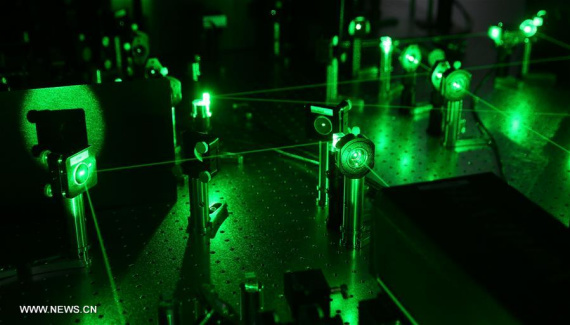
Photo taken on May 25, 2016 shows the quantum simulation laboratory under the Chinese Academy of Sciences, in Shanghai, east China. China plans to launch the world's first quantum satellite that can achieve secure communication in July. The satellite is dedicated to quantum science experiments. (Photo: Xinhua/Cai Yang)
With three significant science and innovation meetings scheduled for next week in Beijing, Chinese researchers are calling on the government to issue policies designed to maximize on the country's innovation prowess.
Thousands of researchers from 31 provincial regions have gathered in Beijing for the Ninth National Meeting of the China Association for Science and Technology (CAST). From Monday to Thursday, participants will discuss the problems holding back innovation in China and submit proposals on how they can be addressed.
Established in 1958, CAST is a state-run organization that engages researchers in the policy-making process. In the previous session in 2011, 613 proposals were submitted.
As China aims to establish itself as an innovative nation by 2020 and an international leader in innovation by 2030, Zhang Peifu, professor of science philosophy with Shanxi University, said that research must be improved as it provides the theoretical premise for breakthroughs.
"In China only a handful of researchers have the passion and patience to explore new principles and new theories in laboratories. Instead, they choose large companies, which offer better remuneration packages," said Zhang.
For those who are not lured by the pay checks offered by big companies, their pet peeve is not the lower pay, but the assessment system that grades researchers based on the number of papers they have published, complained Zhang Yunbo, a professor of physics and deputy chief of the graduate school of Shanxi University.
"Scientific discoveries always appear by chance. There is no set schedule to follow. We desperately need a better evaluation system that respects this and inspires researchers to throw themselves into their studies. A thick portfolio of papers is not a suitable indicator of achievement," said Zhang.
The highest academic title for Chinese scientists and researchers is academician. The biennial conference of academicians with the China Academies of Sciences and Engineering will also open next week.
President Xi Jinping and Premier Li Keqiang both delivered a speech at the 2014 meeting, emphasizing that the direction of scientific research was innovation, and that the most impending task was to get rid of institutional obstacles to unleash the power of science and technology as the primary productive force.
A series of measures have been rolled out over the past few years, including changes to the way in which research funds are allocated. In addition, a new management platform has been set up that links and tracks all significant research and development projects.
Wan Changjiang, deputy general manager of Tianjin Electric Power Co., under the State Grid, said it is encouraging that enterprises are playing an ever-increasing role in innovation.
Technological inventions have been put to commercial use faster than ever before as local governments have doubled efforts to integrate businesses with research institutions, he said.
Guizhou provincial government's Science and Technology Bureau, for instance, has begun to issue technological innovation coupons that help small enterprises purchase new inventions and technology. The government has made 8.55 million yuan (about 1.3 million U.S. dollars) available through this scheme.
Most of the 49 companies having been supported from this project thus far work in the areas of big data, health or are affiliated with university science parks or high-tech business incubators.
The third, and the most eye-catching, conference next week is concerned with science and technological innovation. The leadership is expected to illuminate the direction for future technological innovation. The previous conference was held in July 2012, when then president Hu Jintao made an important address.
Yang Fan, general manager of SenseTime Beijing, which specializes in the development of facial recognition technology, suggested that China's technological innovation strategy must be improved from a global perspective.
"Many people say Chinese companies are too good at business model duplication to achieve independent innovation. Our goal is to develop original technology that will improve people's lives," said Yang.


















































